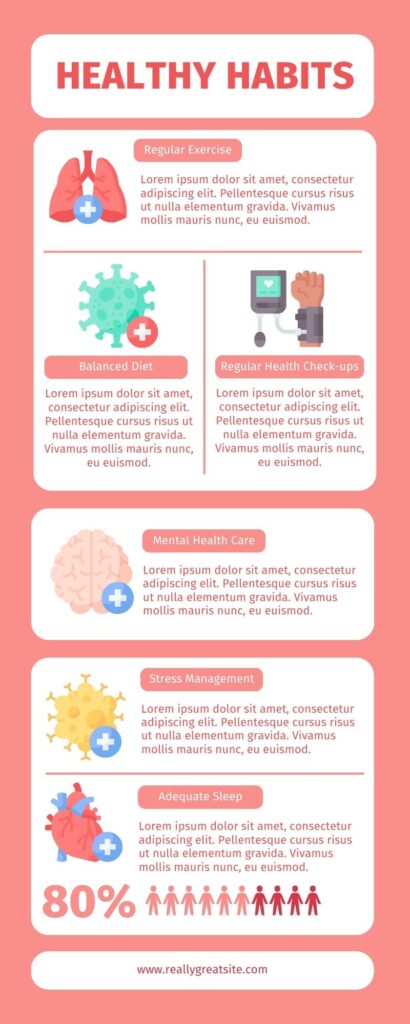The increased rate of work pressure and so many responsibilities in everyone’s life make health and wellness an important aspect in the world. Today health was seen not only as the lack of disease but as physical, mental, and psychological wellness. The following is a step by step guide to Digitaltold on the common aspects of health and healthy living.
Ways to maintain Health and Wellness
This paper mainly focuses on the definitions of health and wellness distinguishing between these two concepts. The body health relates to the physical wellbeing while the wellbeing can be a life health in physical, spiritual, and mental. Health and wellness both seem to be relative, and achieving both can prolong an individual’s feeling of well-being.
For this reason, the following subsection presents the various aspects of health and wellness.
1. Physical Health: Eating right, exercising daily, and getting enough rest is important to the physical well being of a person.
2. Mental Health: Mental health means freedom from mental illness, being able to handle stress, and having optimistic attitude.
3. Emotional Health: Emotional well-being is the ability to relate well, know one’s self, and knows how to express oneself.
4. Physical Health: The Foundation of Wellness

Physical health is said to be fundamental to all the other dimensions of health. When the body is cared for, the mind and soul have a platform to rise from and grow from. Here’s how to achieve and maintain good physical health in today’s world:
1. Nutrition
The basic understanding of nutrition is clear: a healthy diet should be eaten. Good nutrition helps the body and supplies the appropriate nutrients it needs for proper functioning.
. Eat Whole Foods: Select foods that come from the food guide pyramid such as fruits, vegetables, proteins and whole grain products.
. Limit Processed Foods: Lessen the consumption of sweet stuffs, fast foods and food containing unhealthy fats.
. Stay Hydrated: Take a lot of water to enhance digestion, circulation and overall energy levels of the body.
Digitaltold emphasizes that good nutrition can prevent chronic diseases, improve energy, and enhance mood.
2. Physical as well as bodily movement
Our health and our bodies require a good practice of exercise to remain trunk strong, or to regain. Regular exercise benefits the strength of the cardiovascular system, muscular development, and assists overweight individuals.
Daily Movement: According to the CDC, that’s 150 minutes per week of moderate-intensity activity, such as brisk walking.
Strength Training: Strength training or use of body weight exercises should be done at least two times a week.
Flexibility Exercises: Musculoskeletal flexibility can also be achieved through basic yoga and this can help you to reduce on the possibilities of injuries.
3. Adequate Sleep
One cannot overemphasize the importance of sleep as a part of people’s health. That is very beneficial for the body since it gives it time to rest, it helps in boosting the immune system of the body and helps the mind dirty the clarity it needs.
Establish a Routine: Talk to someone about a topic you don’t know much about.
Limit Screen Time Before Bed: Reduce screen time to at least one hour before sleeping to have high quality sleep.
Create a Relaxing Environment: Bedroom should be cool, dark and very quiet to give that best feeling to the body during sleep.
Mental Health: The Key to a Balanced Life
Mental health is an important parts of our overall health and well-being as human beings. In the modern society people experience stress, anxiety and depression due to the life’s increased pace. Here’s how to support mental wellness:
1. Mindfulness and Meditation
As you know, mindfulness as well as meditation help to decrease stress and anxiety, increase working memory, enhance the attitude to life.
Practice Daily Meditation: For beginners, they should limit meditation to 5 to 10 minutes on a daily basis.
Stay Present: Practicing mindfulness Croon allows for the reduction of stress and build or increase in resilience.
Gratitude Practice: In this case, reminiscing on some of the happenings one is thankful for, has benefits when it comes to mood and mental health.
2. Manage Stress Effectively
Living with stress day in and day out can produce different mental and sometimes physical disorders. At some point in life, everyone needs to learn how to deal with stress in order to maintain good health.
Identify Triggers: Understand what is a potential stressor and seek to alter those conditions.
Healthy Coping Mechanisms: Stress can be managed through exercise, deep breathing and social support.
Set Boundaries: Do not overwork and book their schedules to ensure they get to rest at one point or the other.
Having a healthy relationship is so important in emotional health. There is evidence that shows that a person is likely to have better health if they do maintain their relations with their friends and family.
Connect with Others: I can remember to surround myself with positive people – this includes your family and friends.
Limit Toxic Relationships: One must identify the Healthier and Unhealthy or toxic relationships and have adequate limits set if need be.
Seek Support: The person can speak to friends and family or seek the help of a professional counselor or psychologist.
Emotional Health: Here the author focuses on building up of resilience and self awareness amongst individuals.
Cognitive health is the key to attaining great mental health or is the ultimate goal of mental health. It also works in the aspect of training people to control their emotions properly.

1. Self-Awareness
Evaluating awareness is the ability to recognize specific emotions, skills, limitations, and stressors. Analysis procedures are useful since they assist in enlightening the individual.
Journaling: More importantly, reflecting on the thoughts and the feelings may well provide a means of working through the emotions.
Practice Self-Reflection: This includes taking time to assess how you feel about things that a particular situation suggests.
Seek Feedback: Consult other people to gain a different views and how to improve.
2. Emotional Intelligence
Emotional intelligence (EI) is defined the capacity to recognize, use, understand, and manage emotions appropriately within oneself and others.
Recognize Emotions: Pay attention to feelings after different situations and think why they happened.
Empathy for Others: Acknowledge and honor other people’s feelings.
Respond, Don’t React: It’s important to pause before answering to angering situations, at least for five or ten seconds.
3. Building Resilience
According to Grady allegation, resilience refers to the capacity to perform the right thing regardless the situation a person finds themselves in. Significant stress and coercion, which are characteristic of recipients, affect compact and emotional wellbeing; compact and emotional resilience helps overcome all adversities.
Develop Healthy Habits: The emotional and physical rest, regular physical activity, walking and/or meditation expression are all well-known components of resilience.
Learn from Setbacks: Risk management should involve turning all the challenges into opportunities.
Stay Positive: Eliminate negative self-assertions and pay particular attention to positive instructions.
Health and Wellness Tips by Digitaltold
Here are some practical tips from Digitaltold to help you maintain a balanced approach to health and wellness:
Plan Balanced Meals: Eating healthy means that for once make time to prepare good meals for the body and soul.
Set Realistic Goals: Micro-dosage of goals is effective since one is not overwhelmed and motivated to keep pushing to the end of the goal.
Stay Active in Small Ways: Exercise daily regularly, while taking frequent pauses.
Practice Gratitude: Make a conscious effort to think positively so as to enhance state of mental health.
Avoid Information Overload: Reduce screen time and step away devices.
Achieving Work-Life Balance
There is need to achieve some balance or keeping things separated between work and life. If for instance a man or woman has got a job that requires him or her work for many hours at a day, what he or she needs is to balance between work and play.
1. Time Management
Management of time can be used to achieve personal goals of taking care of one’s health.
Create a Schedule: Schedule work time and work out time and sleeping time.
Use Time-Blocking: One must separate certain activities and only do them during a certain time, and no other time.
Set Priorities: Concentration on tasks that can be really beneficial and do not try to do several things at the same time.
2. Limit Overworking
Stress in the workplace may lead to physical and emotional crises affecting an employee. Probably one of the biggest factors is that people fail to set the kind of boundaries that would make it possible for them to attain wellness.
Learn to Say No: Do not take up tasks which exert a lot of pressure on your schedule.
Take Regular Breaks: Short breaks makes us keep on working and feel fresh as compared to long breaks that make us get more tired.
Unplug After Work: Stay out of communications related to work tasks once the working day is over.
The presence and use of technology as it regards to Health and Wellness
New technology provides you with tools and applications that may help you with your healthy lifestyle. Here’s how technology can be beneficial:
1. Health and Fitness Apps
For a fitness app or a diet app or even a sleep cycle tracking app, we can find so many of them available today.
Fitness Trackers: Methods such as Fitbit or an Apple Watch track physical movement.
Meditation Apps: Many applications present themselves as meditation applications, for example Headspace or Calm.
Sleep Tracking Apps: These apps help people learn more about their common activity and quality of sleep.
2. Virtual Therapy and Counseling
People turn to virtual therapy for mental care. Since counseling is done online, people can get the help they need without worrying about the inconvenience that might be caused by traditional sessions.
Affordable Options: Such therapy is cheaper compared to the conventional therapy sessions.
Flexibility: Online sessions can be from home, making them flexible the lack of time due to the many engagements.
Anonymity: convenience through therapist intervention can be fiscally advantageous and offer those suffering the privacy factor which may help them seek help sooner.
3. Telemedicine
Telemedicine enables patients to receive healthcare services, without having to go physically to the clerk, which is economical in terms of time.
Remote Consultations: To some extent, people can seek medical advice from the comfort of their homes.
Health Monitoring: Tools such a blood pressure or glucose monitors connect with applications.
Medication Reminders: Some of the applications are used, for example, to remind of the administration of medicines.
Selected Problem Areas in Health and Physical Fitness
Taking the above explanation into consideration, it is important to understand that health and wellness are not quiet and easy to achieve and maintain careers. Common obstacles include:
Lack of Time: Almost all are pressed for time when it comes to exercising and preparing their meals.
Stress and Anxiety: Chronic stress arising from the day to day activities of life is an enemy of the mental health.
Digital Addiction: Crazy amounts of time spent with a screen are not only bad for the body but for the mind as well.
Workplace Pressure: Pressure at the workplace usually results in burnout.
The digital toll states that people should develop a new schedule of exercises, a healthy diet, and relaxation practices to defeat these difficulties.
Conclusion: Digitaltold: Living Health and Wellness
Challenging health and wellness therefore, ought to be viewed as both physical, psychological and emotional. We at Digitaltold have set the best course towards creating consciousness of an effective and healthy lifestyle. In diet, exercise, sleep, mental, and emotion, there is the opportunity to increase the quality of life.
I have discovered that the use of these practices in your daily life can surprisingly improve one’s mood, thought process, and social behavior. Regardless of whether you are a beginner taking the first steps in the path towards wellness or have made a decision to work on a healthier lifestyle, big steps start with small changes.
Welcome to the road to wellbeing through Digitaltold. A better, a healthier and more balanced life is all but a possibility. NEXT PAGE
Share this content:
